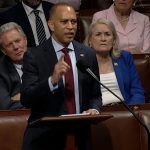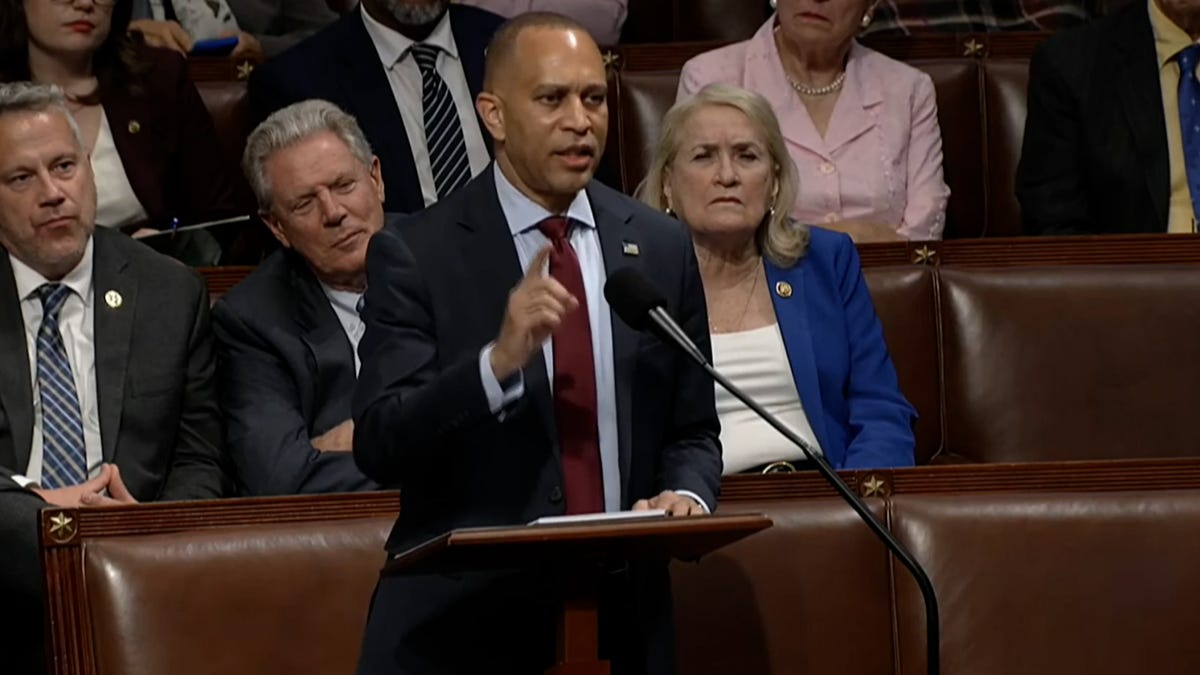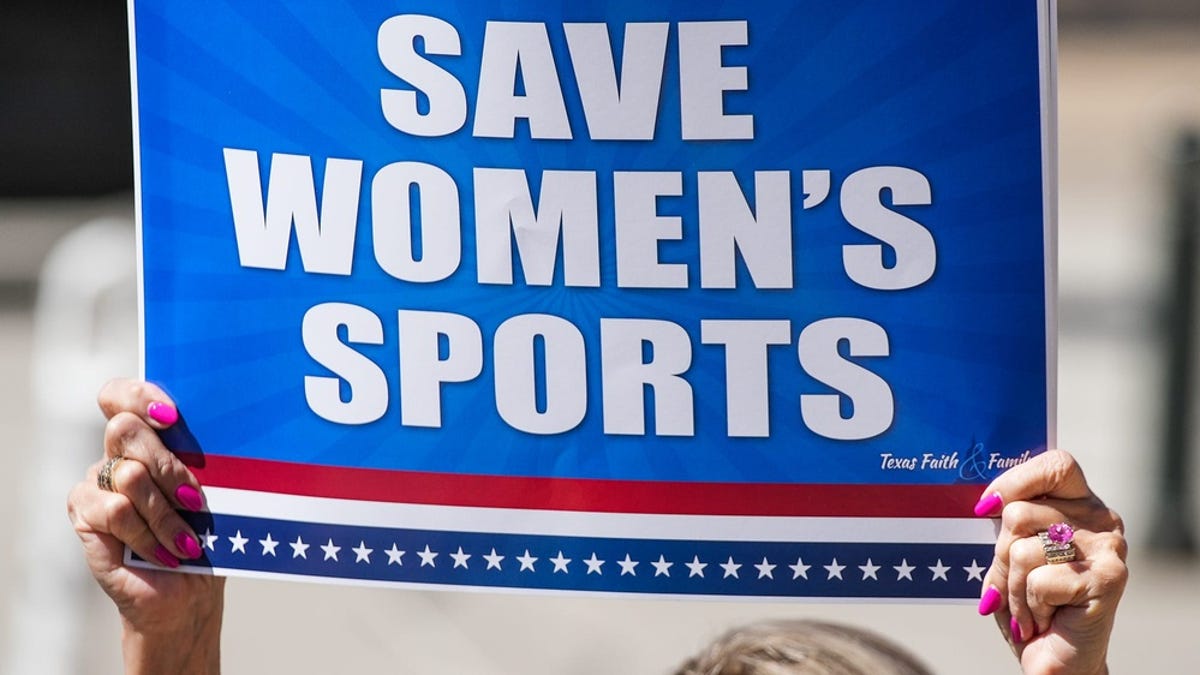On Wednesday’s episode of The Excerpt podcast: USA TODAY Chief Political Correspondent Phillip M. Bailey gives some of his biggest takeaways after the Senate’s passage of President Donald Trump’s bill of legislative priorities. Paramount settles with Trump over a ‘60 Minutes’ interview. The University of Pennsylvania has agreed to prohibit transgender athletes from competing in women’s sports and strip the record of former swimmer Lia Thomas. A big summer of soccer rolls on.
Hit play on the player below to hear the podcast and follow along with the transcript beneath it. This transcript was automatically generated, and then edited for clarity in its current form. There may be some differences between the audio and the text.
Podcasts: True crime, in-depth interviews and more USA TODAY podcasts right here
Taylor Wilson:
Good morning. I’m Taylor Wilson, and today is Wednesday, July 2nd, 2025. This is USA Today’s The Excerpt.
Today, we take a closer look at some of the political ramifications around the bills centered on Trump’s legislative priorities. Plus, Paramount settles with the president over a 60 minutes interview, and Penn has agreed to prohibit transgender athletes from competing in women’s sports and to strip the record of a former swimmer.
After a weekend of debate, the Senate yesterday passed President Donald Trump’s sweeping bill of priorities by a vote of 51 to 50. It preserves 2017 tax cuts, invests billions into the military and border security, and fulfills a major 2024 campaign promise by extending federal tax breaks for low wage tipped workers. Still, the Senate made a slew of changes, meaning it now heads back to the house where it could face some more hurdles. I caught up with USA Today, chief political correspondent, Phillip M. Bailey, for some of the major takeaways.
Phillip, always a treat. How are you, sir?
Phillip M. Bailey:
Taylor, how’s it going?
Taylor Wilson:
Good. Big news here this week. So the biggest point of contention was around Medicaid, clearly. How did this shake out, Phillip? What were some of the specific provisions under the microscope?
Phillip M. Bailey:
There are different things in it that I think he and his supporters will be happy about. Extending the 2017 tax cuts that he did in his first term, boosting military and border security, fulfilling that campaign promise to extend federal tax breaks to low income or low wage tipped workers such as waiters, hairstylists, and others. But what was interesting, Taylor, was that there was bipartisan agreement in opposition to the legislation, and that focused on the cuts to Medicaid, the program set up for low income Americans to provide health insurance.
CBO, the Congressional Budget Office, the nonpartisan agency, estimates this bill as written will cut about $1 trillion from Medicaid over the next decade. And what’s interesting, Taylor, is the focus really was on 71 million people are on Medicaid presently, but there are estimates wildly from 11.8 million all the way up to 20 million depending on what study you look at that say people could be dumped off of the Medicaid rolls as a result of this. Because of that, you saw a bipartisan group of senators, all Democrats and a handful of Republicans, particularly Senator Thom Tillis of North Carolina, object to that and pointing out that, “Hey, look, this is going to hurt folks back in my home state.”
And you saw that from a lot of Republicans leading up to this, even some who voted for it, like Josh Hawley, Republican from Missouri. Even Steve Bannon, one of Donald Trump’s former advisors warned in the early onset of this legislation coming to Congress that, “Hey, a lot of MAGA folks are on Medicaid.” So expect Democrats to really lean into this. They’re already doing it now on social media and in their multitude of platforms. And I think you’re going to see a lot of folks, particularly in red states, are going to be disproportionately impacted.
Taylor Wilson:
Well, Phillip, we should talk about Republican senate majority leader John Thune for a moment. How does he come out of this and what was the impression around him in the GOP before and after getting this legislation through the Senate?
Phillip M. Bailey:
Well, look, if there’s anyone who’s probably breathing a sigh of relief, it’s Senator John Thune, the new Senate majority leader out of South Dakota. After the 2024 election when Mitch McConnell announced that he was leaving his post a Senate Republican leader, there were a lot of hand-wringing between the Trump folks and MAGA folks and more traditional Republicans. And the MAGA folks were not very happy with the idea of John Thune. They looked at him as sort of a rhino, looked at him as too much of a centrist. So there was a lot of misgivings about him initially.
And even during this process, these marathon of debates, marathon of amendments, marathon of votes, right? The vote-a-rama as it’s called. Thune really tried to keep that Republican herd of 53 caucus members together as best as possible. He knew he was going to have certain defections. So I think what we’ll see in these behind the scenes reporting from our folks up on Capitol Hill is that Thune really played the behind the scenes game very well, particularly when it came to Republican holdout Lisa Murkowski of Alaska, who was the critical vote.
There were three Republicans who ultimately voted against Trump’s agenda in the Senate. Susan Collins of Maine, Senator Tillis obviously of North Carolina, and Senator Rand Paul of Kentucky. Well, many thought that Lisa Murkowski was on the fence as well, and she was. But when you see the concessions and negotiations that were being made behind the scenes by Thune’s team, it focused pretty much on Alaska. Alaska got every exemption from some of this more Draconian pieces of the bill. So she has ultimate leverage here, and she used it quite effectively. But even she said after the vote how excruciating this process was. But I think, look, for Senate majority leader Thune, this I think buys him a little bit of grace. I will say this though, I wonder, will there be any pushback? Because now this is going to be, particularly when it comes to the Medicaid cuts, it’s going to be a big issue in 2026. And Senator Thune was a very critical voice against Donald Trump when it came to the January 6th, 2021 riots. He opposed Trump’s efforts to overturn the 2020 election. He supported Senator Tim Scott to be the Republican nominee instead of Donald Trump. So he’s been someone who has been very critical, and the MAGA folks kept their eye on Thune. So I don’t know how long this grace period will last, but Senator Thune for his first major test as majority leader, I think passed.
Taylor Wilson:
Well, Elon Musk was back in the headlines this week, Phillip. He and President Trump continue to trade jabs, especially in the context of this legislation. Just what did we hear this week and did any of this have an actual impact on the Trump legislative goals?
Phillip M. Bailey:
Yeah. Elon returns, right? I mean, we saw from last month that Elon Musk, the world’s richest person, was having an on-again off-again, frenemy relationship with the president, was very critical. Lobbed a lot of personal attacks against Donald Trump last month that he basically pulled back from and said, “My bad. I shouldn’t have taken it that far.” Basically eluding to or suggesting that President Trump was in the Epstein files. There is no evidence of that at this point.
But Musk returned over the weekend to really speak out against the Big Beautiful Bill, mainly on grounds of how much it adds trillions of dollars to the national debt. He called out Republican lawmakers, often by name, saying, “How could you vote for this when you campaigned for cutting government spending?” And he pledged that he was going to use his billions to fund and to support Republican primary challengers against those incumbents in next year’s midterms.
That isn’t surprising, I guess, considering Musk and his fiscal Hawk position previously. I think what folks didn’t anticipate maybe is how much Donald Trump has turned up the heat as well on Musk, saying that, “Hey, all those subsidies you’re getting, Elon, we’re going to examine those as well.” But then the President escalated, right? He didn’t just mock Musk for receiving those government subsidies. He then indicated that maybe it’s time for Elon Musk to return to his birthplace of South Africa, basically threatening deportation of the tech entrepreneur. When he was asked by reporters, “Are you saying that he should be deported?” He said, “Maybe we need to look into that.”
So I think, look, this on and off relationship with Musk and Trump I think has now turned for the worst. I don’t see it mending anytime soon. However, both men are known to have a lot of bravado on social media at one point, and then in person things are all good. So there’s a potential for this relationship to be mended. A lot of Republican lawmakers would like for it to be. It’s not great to have the President and the biggest financial supporter of the Republican Party at odds, but I don’t know where the off-ramp is for the two. And we’ll have to keep watching Truth Social and X because that seems to be the only place these two men know how to speak to one another.
Taylor Wilson:
Yeah, I doubt that’ll be the last we hear of that, Phillip. Anyway, the bill moves to the House now. What are you keeping an eye on as the House approaches this?
Phillip M. Bailey:
House Republicans, who are far more conservative, I think, than their Senate Republican counterparts, this bill passed barely back in May out of the House. 215 to 214 votes. The closest vote it could possibly be. Speaker Mike Johnson has said that it will pass. But any changes that are made, Taylor, means it would have to go back to the Senate and the process would start all over again. And President Trump has imposed this July 4th deadline. And you already have some House Republicans who have said, “I really don’t like what the Senate did. I think they were a little too liberal on some of these things.” And for fiscal hawks who promised in their districts to rein in spending, this bill does not necessarily do that.
Now, Vice President Vance has tried to calm those waters by saying that, “Hey, look, these things are immaterial compared to the changes that we’re making to border security. The economy’s going to improve, and that’s what we’re going to make up the difference.” But during the 2024 Republican primary, there were a lot of hits against President Trump’s first term for adding so much to the deficit. President Trump’s not really taking the carrot approach the vice president’s taking. He’s offering nothing but the stick. He said down in Florida, when asked about hold outs to the Republican party, he said it’d be very wise for them to get on board, and if they don’t, quote, “They’ll suffer the consequences,” unquote. And ask Senator Tillis what that looks like.
So we’re going to pay attention over these next few days how this bill comes out on the House side, but it looks like the odds are in President Trump’s favor. He certainly has reasserted his dominance of Washington, but these razor-thin margins that he has both in the House and Senate add a lot of drama and I think gives certain individual members a lot of leverage to get maybe specific concessions that may make them vote for the bill after all their chest-thumping in public.
Taylor Wilson:
I always love picking your brain, Phillip. Phillip M. Bailey, USA TODAY’s chief political correspondent, thank you, siPhillip M. Bailey:
See you, man.
Taylor Wilson:
You can stay with usatoday.com for all the latest through House deliberations and President Trump has set a self-imposed deadline for Friday, July 4th.
♦
CBS Parent Company, Paramount has settled a lawsuit filed by President Trump over an interview broadcast in October. Paramount said it would pay $16 million to settle the suit with the money allocated to Trump’s future Presidential Library and not paid to Trump directly or indirectly. The company added that the settlement does not include a statement of apology or regret. Trump filed a $10 billion lawsuit against CBS in October, alleging the network deceptively edited an interview that aired on its 60 Minutes news program with then vice president and presidential candidate Kamala Harris, to tip the scales in favor of the Democratic Party in the election.
In an amended complaint filed in February, Trump bumped his claim for damages to 20 billion. According to the suit, CBS aired two versions of the Harris interview where she appears to give different answers to the same question about the Israel Hamas war. CBS previously said the lawsuit was completely without merit.
♦
The University of Pennsylvania has agreed to prohibit transgender athletes from competing in women’s sports, and to strip the record of former swimmer, Leah Thomas, as part of an agreement with the Department of Education. Penn entered the resolution agreement yesterday to comply with Title IX, the DOE announced, as the university has been under investigation surrounding the case of Thomas, who became the first openly transgender athlete to win an NCAA Division 1 title. Under the agreement, Penn will restore the swimming records and titles of its female athletes that were broken by Thomas. The University will also not allow transgender athletes to compete in female athletic programs, and it has to send personal apology letters to impacted swimmers.
♦
The quarterfinals are now set in the FIFA Club World Cup, the soccer tournament hosted by the US saw Real Madrid beat Juventus yesterday, followed by Borussia Dortmund over Monterrey, and the quarterfinal matchups are set for Friday and Saturday in Orlando, Philadelphia, Atlanta, and New Jersey.
Meanwhile, also in soccer, the U.S men’s national team will take on Guatemala tonight in the Gold Cup. They’ll play the winner of Mexico and Honduras if they advance. You can stay with USA Today Sports for more.
♦
And later today, we all navigate them, whether they be the walls throughout our homes, neighborhoods, and the places we choose to frequent, or the internal walls that allow us to maintain our distance from others. But what do the walls we erect represent when we look at how they shape our society as a whole?
Anand Pandian:
In fact, it was the border wall in particular, and the slogan, “Build the Wall.” That was such a powerful image and idea in the run-up to the 2016 presidential election that motivated me to pursue the research for this book.
Taylor Wilson:
That was Anand Pandian, professor of anthropology at Johns Hopkins University and author of a new book, Something Between Us, on shelves now. Anand joins my colleague Dana Taylor, to discuss his experiences seeking out people whose views he disagrees with, to explore whether our disconnection is a choice or a consequence of living within a world of physical, political, and psychological walls. You can hear that conversation right here today, beginning at 4:00 p.m. Eastern Time.
♦
Thanks for listening to The Excerpt. You can get the podcast wherever you get your audio. And as always, you can email us at podcasts@usatoday.com. I’m Taylor Wilson, and I’ll be back tomorrow with more of The Excerpt from USA Today.








